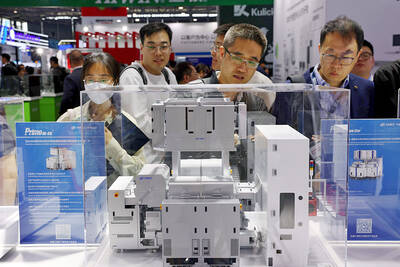The great cryptocurrency crash of this year is heading for its worst week yet.
Bitcoin yesterday sank toward US$4,000 and most of its peers tumbled, extending the Bloomberg Galaxy Crypto Index’s decline since Friday last week to 23 percent.
That is the worst weekly slump since crypto mania peaked in early January.
Even after losses exceeded 70 percent for most virtual currencies, Oanda Corp’s Stephen Innes has yet to see strong evidence of a capitulation that would signal a market bottom.
“There’s still a lot of people in this game,” Innes, head of trading for the Asia-Pacific region at Oanda, said by telephone from Singapore.
If bitcoin “collapses, if we start to see a run down toward US$3,000, this thing is going to be a monster. People will be running for the exits,” he said.
Innes said his base-case forecast is for bitcoin to trade between US$3,500 and US$6,500 in the short term, with the potential to fall to US$2,500 by January.
The market value of all cryptocurrencies tracked by CoinMarketCap.com sank to US$138 billion, down from about US$835 billion at the market peak in January.
The rout’s biggest casualties: individual investors who piled in just as prices peaked, and companies like Nvidia Corp that supplied the crypto ecosystem.
The California-based chipmaker has lost nearly half its value since the start of last month as demand for its cryptocurrency mining chips collapsed and results in its gaming division disappointed.

SEMICONDUCTOR SERVICES: A company executive said that Taiwanese firms must think about how to participate in global supply chains and lift their competitiveness Taiwan Semiconductor Manufacturing Co (TSMC, 台積電) yesterday said it expects to launch its first multifunctional service center in Pingtung County in the middle of 2027, in a bid to foster a resilient high-tech facility construction ecosystem. TSMC broached the idea of creating a center two or three years ago when it started building new manufacturing capacity in the US and Japan, the company said. The center, dubbed an “ecosystem park,” would assist local manufacturing facility construction partners to upgrade their capabilities and secure more deals from other global chipmakers such as Intel Corp, Micron Technology Inc and Infineon Technologies AG, TSMC said. It

EXPORT GROWTH: The AI boom has shortened chip cycles to just one year, putting pressure on chipmakers to accelerate development and expand packaging capacity Developing a localized supply chain for advanced packaging equipment is critical for keeping pace with customers’ increasingly shrinking time-to-market cycles for new artificial intelligence (AI) chips, Taiwan Semiconductor Manufacturing Co (TSMC, 台積電) said yesterday. Spurred on by the AI revolution, customers are accelerating product upgrades to nearly every year, compared with the two to three-year development cadence in the past, TSMC vice president of advanced packaging technology and service Jun He (何軍) said at a 3D IC Global Summit organized by SEMI in Taipei. These shortened cycles put heavy pressure on chipmakers, as the entire process — from chip design to mass

Germany is to establish its first-ever national pavilion at Semicon Taiwan, which starts tomorrow in Taipei, as the country looks to raise its profile and deepen semiconductor ties with Taiwan as global chip demand accelerates. Martin Mayer, a semiconductor investment expert at Germany Trade & Invest (GTAI), Germany’s international economic promotion agency, said before leaving for Taiwan that the nation is a crucial partner in developing Germany’s semiconductor ecosystem. Germany’s debut at the international semiconductor exhibition in Taipei aims to “show presence” and signal its commitment to semiconductors, while building trust with Taiwanese companies, government and industry associations, he said. “The best outcome

Semiconductor equipment billings in Taiwan are expected to double this year, as manufacturers in the industry are keen to expand production to meet strong global demand for artificial intelligence applications, according to SEMI, which represents companies in the electronics manufacturing and design supply chain. Speaking at a news conference before the opening of Semicon Taiwan trade show tomorrow, SEMI director of industry research and statistics Clark Tseng (曾瑞榆) said semiconductor equipment billings in Taiwan are expected to grow by an annual 100 percent this year, beating an earlier estimate of 70 percent growth. He said that Taiwan received a boost from a